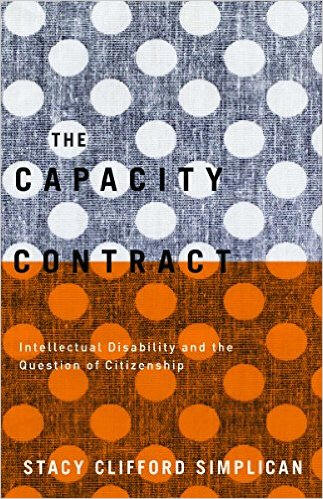Book Review
The Capacity Contract:
Intellectual Disability and the Question of
Citizenship
Stacy Clifford Simplican
University of Minnesota Press
ISBN:
978-0816694037
 This
proved to be a very interesting read. In order to function fully in the
democratic process as we have it now, we need to reason, reflect and
deliberate. The author argues that this means that people with
intellectual disability are deprived of political standing because they
are less able to reason, reflect and deliberate. This leads to the
somewhat startling conclusion that the democratic process discriminates
against those with intellectual disability.
This
proved to be a very interesting read. In order to function fully in the
democratic process as we have it now, we need to reason, reflect and
deliberate. The author argues that this means that people with
intellectual disability are deprived of political standing because they
are less able to reason, reflect and deliberate. This leads to the
somewhat startling conclusion that the democratic process discriminates
against those with intellectual disability.
As the author notes, this conclusion is not that surprising. John Locke, that great philosophical promoter of democracy, used cognitive capacity as a way to enforce exclusion. Unfortunately, medical professionals have also used their skills to rehabilitate some people with intellectual disability into conformity with the capacity contract while others were hidden away from society.
It is ironic that democracy actually excludes the intellectually disabled. As the author says, there should be other ways of engaging the vulnerable and disabled as valued citizens.
The capacity contract, argues the author, excludes anyone who does not have capacity on the one hand and on the other hand sees incapacity as essential to human life and so bases democratic solidarity on shared human vulnerability. The contract promotes the fiction that we are all cognitively equal. It also seeks to contain our anxiety about our obligations toward those with intellectual disability.
The author admits that re-envisioning democratic politics to enable the intellectually disabled to fully participate will not be easy. For example, can the person measure up to the duties of citizenship? If not, who becomes responsible to speak and act on behalf of that person?
Classifying people as having intellectual disabilities has real consequences. During the eugenic era, a diagnosis of intellectual disability allowed for state sponsored sterilization campaigns and the institutionalising of children and adults with intellectual disability. Even today, a pre-natal diagnosis of Down syndrome leads to abortion in ninety per cent of cases in the United States.
One response to the numerous institutional abuses of those with intellectual disability has been the promotion of an ethics of care. Unfortunately, caregivers themselves have been guilty of such abuse. The author also notes that disability advocates embrace a social model of disability and this could silence individual experiences of pain and frustration.
The tools the author advocates to empower the intellectually disabled are alliance, humour and dance. I am not so sure about this.
Still, the current problems are well laid out here in this book. It makes for thoughtful reading.
Reviewed by Dr Pravin Thevathasan
